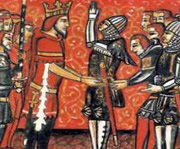LIBERALISM
6. Monday, September 4. The Historical Roots of Liberalism.
Today's Assumption: The foundations of Liberalism had nothing to do with Liberalism.
Read: Weber, Protestant Ethic (Reader, pp. 86-100), and
Stephenson, Medieval Feudalism (Reader, pp. 73-85).
7. Wednesday, Sept. 6. The Revolutionary Power of Mass Politics.
Today's Assumption: The tumultuous intrusion of the "unwashed and unwanted" into the political world was totally unanticipated by those who make it possible. It could only have happened in this way.
Read: excerpt from Fasel, Modern Europe (Reader, pp. 101-117); “Declaration of the Rights of Man” (Reader, 118); and Kingdon, America the Unusual, ch. 4
8. Friday, September 8. Discussion Section.
Paragraph Assignment: What did McAdams mean when he said that 'You are all Protestants'? And why would this issue be important for studying politics? In responding to this question, make sure you have read Weber's chapter closely.
Discussion #3: Why is diversity (of all kinds) such an important part of American identity? When does diversity endanger this identity, or does it? Re-read Kingdon, chapter 4.
9. Monday, September 11. Fascism, Communism, and the Crisis of Democracy in the 20th Century.
Today's Assumption: There was nothing inevitable about the success of Liberalism. Liberal democracy was nearly obliterated by its enemies.
Read: Benito Mussolini, "The Doctrine of Fascism” (Reader, pp. 120-129); and Excerpts from Voices from the Third Reich (Reader, pp. 130-135).
Read and reflect upon what American fascists believe: National Socialism or National Socialism for Teens (links). (Note: These are offensive sites; you don't have to read them if they make you uncomfortable).
For a little bit of history that demonstrates why Notre Dame students, and Catholics in particular, should have strong reasons for opposing fascism, racism, and discrimination, read the following articles in your Reader:
"Notre Dame Students vs. the Ku Klux Klan (Reader, pp. 136-7).
Evening Film I: "The War at Home"
Tuesday, Sept. 12, 7:00 p.m., or Wednesday, Sept. 13, 7:00 p.m.; location for both showings: 140 DeBartolo |
10. Wednesday, Sept. 13. The Welfare States as a Response to Liberalism's Enemies.
Today's Assumption: The welfare state, from which we all benefit, is essential to Liberal democracy. However, this does not mean that all welfare-states are the same. We will look at two different cases: America and Britain.
Read: America the Unusual, chapters 1, 2, and 3; and Read Comparing Welfare States (link)
11. Friday, September 15. Discussion Section.
Paragraph Assignment: Under what conditions could Americans become fascists? And why?
In responding to this assignment, make sure that you clearly cite at least one of your readings on fascism to make your point.
WebCT and Discussion #4: “The temptations of fascist ways of thinking are strong enough to defeat liberalism.” Yes or No? (“Maybe” is not an option). Be prepared to justify your stand. In doing so, make sure you understand the arguments that can be raised against you.
Also, re-read the two previous assignments, Kingdon and Comparing Welfare States.
Your first essay assignment is Right Here. Be sure to follow every aspect of the instructions!
|
12. Monday, September 18. Liberalism is a decidedly Historical Process.
Today's Assumption: Contemporary Liberalism isn't what it was in the past and it will be profoundly different in the future. If it weren't different, it wouldn't be Liberalism. It's as simple as that.
Fluid roles (Catholic citizens); fluid institutions (the FBI); and fluid ideas (patriotism).
Lots of mostly short readings (and you've already read the ones about ND students battling the Klan):
Kingdon, America the Unusual, ch. 5;
For the perspective of a citizens' militia,,
read The Michigan Militia, “In Defense of Liberty II” (Reader, pp. 142-147) and scan their Site;
For a Libertarian perspective, Paul Craig Roberts, “Government and Country” (Reader, pp. 148-9);
For a more recent Notre Dame experience, Elizabeth Christman, "The Story of Notre Dame" (Reader, pp. 138-41).
And, "America's Team." Re-read:
"Notre Dame Students vs. the Ku Klux Klan (Reader, pp. 136-7);
Also, as a follow-up to Huntington's article on immigration, read about the Arizona Minutemen.
Update: Interestingly, I mentioned the FBI's surveillance of John Lennon in this lecture, and the following article appeared in the New York Times two days later: Lennon. For the purposes of debate, compare the Lennon article with this one about the detention of American citizens. Are the two cases comparable? To the extent that they are, were they handled in the correct way? How would you define "the correct way" if you were advising the FBI?
13. Wednesday, Sept. 20. Discussion Section.
Discussion section #5: What is the nature of American liberalism today and why do we (sometimes) find it uncomfortable?
Silence in the Streets
Important Note: We will have an in-class discussion today instead of a lecture. Prepare for this discussion by re-reading the assignments for Monday.
14. Friday, September 22. No Discussion Section.
Your First Reflective Essay is due on this date.
RETURN TO COURSE HOME

